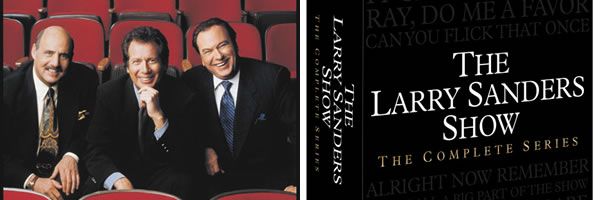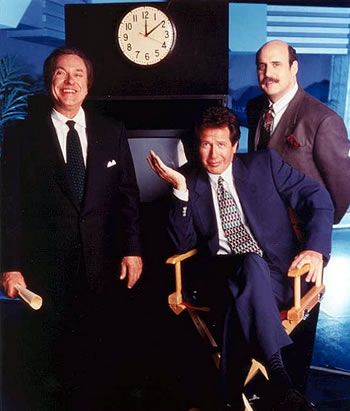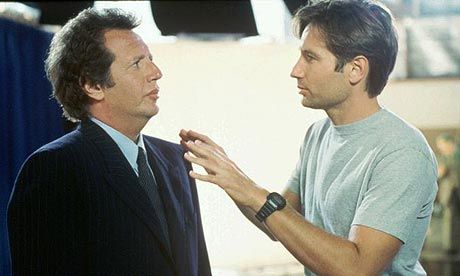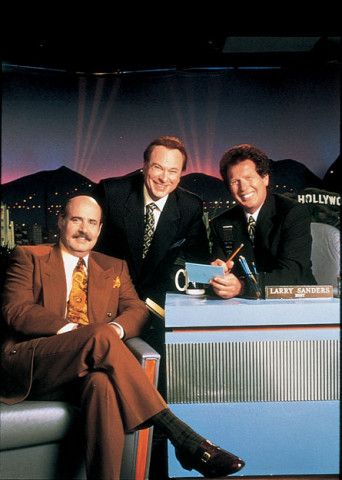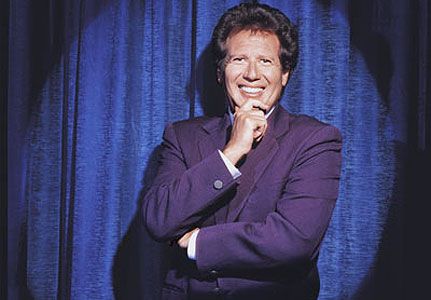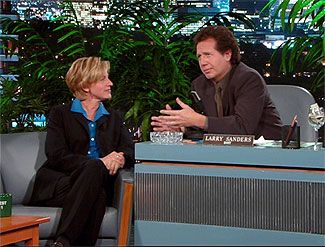There was a sense in 2007 that we were never going to get The Larry Sanders Show in its entirety on DVD. Sony was struggling to get the music rights and so they put out the first season on DVD and then a “best of” that harvested 23 (out of 89) of the show’s greatest episodes, while also getting star Gary Shandling to host some of the most amazing Q&A’s ever produced for DVD. Leave it to The Shout Factory! - those artists of TV box sets - who cleared all the red tape so we can now have the complete six-season, eighty-nine episode run in a gorgeous box set that includes all previous supplements, and adds new content.
Gary Shandling stars as Larry Sanders, a talk show host dealing with the passive aggression of Hollywood, and his support staff - with producer Artie (Rip Torn) and sidekick Hank Kingsley (Jeffery Tambor) his main collaborators. The show follows the last six years of the show as it goes from being a reasonably successful late night talk show spot, to one where the network is looking for a younger voice, with that voice being Jon Stewart. That Stewart plays himself shows how much the show blended reality and comedy. My review of The Larry Sanders Show: The Complete Series on DVD after the jump.
Shandling is Sanders, a neurotic talk show host who is dripping in Hollywood behavior. Larry likes to be the loved guy - he tells all the guests that he’s a big fan while not always knowing their work, he likes using the show to meet women, and likes his role as the king who doesn’t know how everything behind the scenes is done, but is still the boss. His right hand is Artie (Rip Torn), his producer and the guy who can get angry for him and say no, but can chatter endless about how great a guest is, and is happy to get them a fruit plate. He’s a bullshit maestro. The other hand is his sidekick Hank Kingsley (Jeffery Tambor), whose catchphrase is "Hey now!" and is mostly buffoonish, but also has an underbelly of resentment and anger that is tempered by him being exceptionally clueless. The support staff includes Larry’s personal assistant/secretary Beverly Barnes (Penny Johnson), writers Phil (Wallace Langham), Jerry (Jeremy Piven) and Wendy (Sarah Silverman), Hanks PA's Darlene (Linda Doucett) and then later the very gay Brian (Scott Thompson), talent wranglers Paula (Janeane Garofalo) and Mary Lou (Mary Lynn Raskub), and Larry's agent Stevie Grant (Bob Odenkirk), who is a true asshole.
This is a powerhouse cast, though most episodes offer guest stars. Some of the more memorable guest spots are the one’s done by Alec Baldwin - who has slept with Sander's ex (Kathryn Harrod), David Duchovny - who nurses a strange crush on Larry, Sharon Stone - who Larry wants to have a relationship with until he realizes she's more famous than him, Dave Chappelle - who ruins Langham's pilot script when he's brought in to be in it, and Jon Stewart - who eventually takes over Sanders show. Those are some of the money guests, but there’s an amazing range of actors and actresses who show up and often mock their image, including Sean Penn, Mimi Rodgers, Jim Carrey, Ben Stiller, Dana Carvey, Carol Burnett, Ellen Degreneres, George Segal, Roseanne Barr, Brett Butler, Elvis Costello, Jeff Goldblum, Jerry Seinfeld, Robin Williams, Jennifer Aniston, and more.
One of the greatest episodes is the deeply meta one where Larry looks for a talent to follow his show. He talks to Letterman, who wants Tom Snyder and tells Larry as much, to which Larry hires Snyder away or so he thinks. As anyone familiar with the situation at the time, the joke was played out in the public as a non-joke when Letterman revealed he did pick Snyder as his follow up. There’s a lot of inside baseball in the show, and that’s where it excels. Actors get to play asshole, or sexed up, or sweet versions of themselves, and so they are playing characters while still having the veneer being like the cameos on SNL or a roast. There’s real bite when a performer calls Larry an asshole, or behave despicably while also making it evident that what they’re doing is knowing. Sanders is one of the rare shows that really does feel like it lifts the scrim that separates the public and the private lives of entertainers.
But more than that, this is such a complete series, with living breathing characters that gets at some of the nuts and bolts of working relationships. In one episode an Entertainment Weekly reporter goes backstage to watch the show, and Larry is blissfully unaware of the drama that unfolds backstage. As he should be. It’s a common gag (“what’s kept from the star”), but in another episode Larry “plugs in” to his support staff and is horrified that these people want to know him on a personal level. He’s happy to be kept a certain distance from them, because it’s the only way he can do his job. Another great episode has Bobcat Goldthwait terrorizing the set after having done a similar stunt on Leno. The show ends with Artie and Larry chastising Bobcat, closing the door and celebrating the ratings spike they’ll surely get with the appearance. It’s in moments like that when the end music kicks in that the music acts as a Rorshack test. Sometimes the end music feels like a punchline, other times it comes across as a reminder of how full of shit the whole process of making a talk show is – it’s brilliant.
They talk on the box set about how important it was to have Larry in a serious relationship at the beginning of the program, but there’s a lot of fun to be had in later episodes where Larry is trying to nail a number of his guests. The awkwardness and use of power is fascinating, as are the on screen versus backstage behavior. This comes off best in some of the final episodes where Sanders is dating Illeana Douglas (playing herself), and coaches her on how to be a good talk show guest. She freaks out afterwards: “I feel like you put more effort into my performance on your show than you have our relationship!” Larry can’t deny it, but the wrap up (she’s also an insecure actress) is just as real.
There is a level of sustained brilliance throughout, but watching the series in total, toward the end of the run, the shows hit a level of situation comedy familiarity – perhaps the writing staff changed a bit – where things feel more familiar in terms of structure and pay off. But even an episode that you can tell where it’s going – like “Pilots and Pens Lost” – still offers so much. In it Artie loses a pen Sanders bought him, and so he scrambles for a replacement, with each detail about the pen humiliating Artie, while the writer Phil has a hot script with the network about a Seattle Ska band, but then they bring in Dave Chappelle as the drummer. Of course the minute Dave gets attached, the premise goes out the window. The show then sets about getting everyone back in order by the end, but the truth of Phil’s pitch (that everyone loved) mutating into a show that has nothing to do with the initial idea is one of those great moments where they nail the development process. Even if structurally you know where the show is going, they still hit some high points along the way. You can say the same for the episode “Putting the ‘Gay’ Back in Litigation,” where Scott Thompson’s Brian sues the show and Phil for sexual harassment. The show ends with a “sexually curious” kiss, but in getting to it there’s a great dialog about sexual harassment, and a good contrast between Beverly and Brian – as Beverly thinks Brian needs god and made a choice.
But the all-star of the show is Jeffery Tambor’s Hank Kingsley. One moment that killed me early on is when Garry Shandling does a monologue and notes that a lot of rappers have the word Ice in their names, and then asks Hank what his rap name would be. Hank’s response: “Hank the Rapper.” It’s this pitch-perfect cluelessness for television. And Tambor is walking a very fine line with a character who knows he’s a sidekick, and takes advantage of his cluelessness, but there’s also a lot of anger underneath. The classic Hank episode is “Hank’s Night in the Sun” where Kingsley is made the guest host for one night, and does shockingly okay. When he’s scared and unsure of himself he does a reasonably good job, but the second that success gets to his head he asks for a second night of hosting, and Artie and Larry decide the only thing to do is let him go again, to which Hank fails miserably. Artie spells out Hank’s conundrum, but it’s a great episode, because it reveals a great human truth about how people accept and or like others. When Hank is consumed with a taste of power, he absolutely and utterly blows it.
Even without mentioning the presence of writer/producer Judd Apatow, this is a behemoth of a TV show, something that helped spawn The Office, Curb Your Enthusiasm, and the one-camera, behind the scenes edict that makes 30 Rock a stunner. You can tell Ricky Gervais watched it before his version of The Office as well. Every episode is a keeper, every episode offers stunning bits of business that are both insightful and hilarious, though - like its offspring – are sometimes hard to watch.
And this set is a keeper. Shout Factory got all 89 episodes, and spreads them out over 16 discs, with an additional disc for supplements. The show is presented in full frame (1.33:1) and in 2.0 stereo. The first two discs feature the entire first season with the first disc offering an intro (3 min.) with Gary Shandling, and a commentary on the first episode with Shandling and writer/producer Peter Tolan, while the second disc offers “A Personal Visit with Carol Burnett” (16 min.), an interview with Jeremy Piven (6 min.), and a deleted scene (2 min.). Disc three through five are Season two with Disc 3 having deleted scenes (14 min.), disc 4 has a deleted scene (1 min.) and disc 5 has a lecture at USC with Shandling (42 min.), personal interviews with Alec Baldwin (19 min.) and Jerry Seinfeld (24 min.), an interview with Bob Odenkirk (5 min), and outtakes (5 min.).
Season Three is on discs six through eight. Disc 6 offers commentary on “Hank’s Night in the Sun” with Shandling and director Todd Holland, and deleted scenes (6 min.), disc 7 has deleted scenes (17 min.), and disc 8 has an interview with Linda Doucett (11 min.), and Penny Johnson (10 min.), a personal visit with Sharon Stone (23 min.), deleted scenes (8 min.), and outtakes (10 min.). Discs nine through eleven are for Season four, with disc 9 offering a commentary by Todd Holland on “The Bump,” disc 10 includes a Holland commentary on “Hank’s Sex Tape” and deleted scenes (5 min.), while discs 11 offers interviews with Janeane Garofalo (8 min.), Scott Thompson (9 min.), Wallace Langham (7 min.), deleted scenes (5 min.), and outtakes (6 min..).
Season Five is on discs twelve through fourteen, with disc 12 offering Holland commentary on the episode “Where is the Love,” and deleted scenes (23 min.), disc 13 has deleted scenes (2 min.), and disc 14 includes personal visits with David Duchovny (10 min.) and Ellen Degeneres (5 min.), the “John Markus Story” (3 min.) on getting Ellen to do the show, deleted scenes (3 min.) and outtakes (9 min.). Discs fifteen and sixteen offer the sixth and final season, with disc 15 offering deleted scenes (15 min.), and disc 16 offers commentary with Judd Apatow and Shandling on “Putting the ‘Gay’ Back in Litigation,” and Shandling and Peter Tolan on the final episode “Flip.” Also included on this disc are interviews with Sarah Silverman (9 min.) and Mary Lynn Rajskub (8 min.), deleted scenes (23 min.), and outtakes (4 min.). All discs menu audio feature wild audio for additional dialog recording or for syndicating where they had to remove the foul language.
The Seventeenth and final disc offers a feature length making-of hosted by Greg Kinnear (71 min.), which offers a bit of Shandling’s bio, and then covers the making and cast that seems made out of a lot of the interviews that were conducted for the set. This is followed by personal visits with Tom Petty (21 min.), Jon Stewart (10 min.), and then Judd Apatow (8 min.). There’s then a conversation with Shandling, Rip Torn and Jeffery Tambor (12 min.), then Emmy Campaign stills, and a brief afterwords from Shandling (2 min.).
The new material are the deleted scenes and outtakes, while all the interview footage was done for the Best of set from a couple years back. It may be old, but wait until you see Shandling sit down with Sharon Stone. They obviously have a past, and for 18 minutes you get to see them dance around each other, trying to get close while still having wounds. It's mesmerizing. Or watching Shandling talk with peer Jerry Seinfeld, or ex-girlfriend Linda Doucett, or even Carol Burnett or Tom Petty. These interviews are so voyeuristic that it's hard not to feel kind of dirty watching them. Shandling - who seems to have gotten into Buddhism from the supplements (and the tattoo he got) - was trying to find peace, and it looks like he left some wreckage that makes these interview sessions partly a therapy session to deal with his baggage. As such the results of these candidly naked interviews are a tough emotional struggle to get through. Shout Factory has done some amazing work in the past, but this may now be their crown jewel. The Larry Sanders Show is one of the great achievements in television. This is essential.

